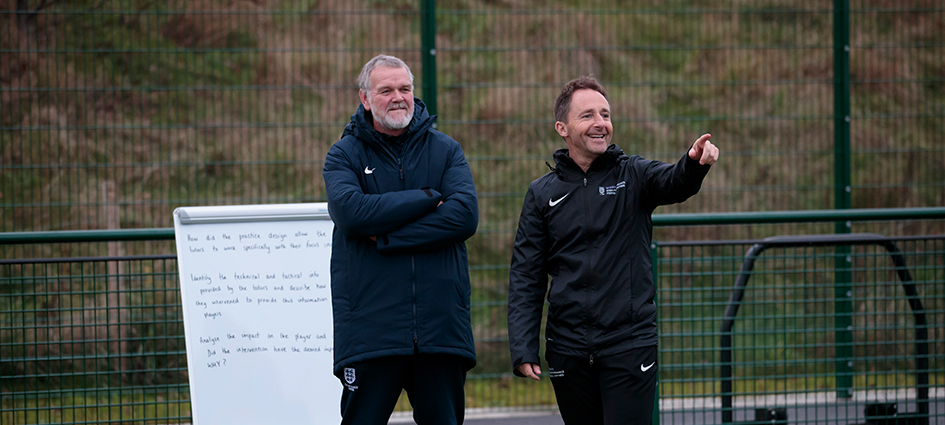Effective practice design

How to keep learning as a coach
- Jack Walton
- 09 October 2019
FA regional coach development manager, Jack Walton, provides a number of ideas for coaches who want to continue their learning before, during and after FA courses.
Two lumberjacks, as the fable goes, were competing head to head in a logging competition.
The first lumberjack set about cutting his logs like a man possessed. He was surprised to see his competitor walking off and leaving his logs for ten minutes every hour. Surely victory would be his if he just kept going. At the end of the gruelling competition the first lumberjack couldn’t believe it when he found out he had lost. He turned to his rival and asked ‘how did you beat me when you were doing nothing for so long?’
‘I wasn’t doing nothing’ came the response ‘I was sharpening my saw.’
The FA coaching pathway is now more extensive and wide-ranging than ever before but what do you do as a coach to sharpen your own saw away from formal coach education? My guess is more than you think. Just by reading this article you are demonstrating a commitment to improve yourself as a coach.
When I speak to grassroots coaches their thirst for knowledge is inspiring and many understand how important it is to implement the ‘formal knowledge’ from courses into their own ‘real world’. Nash and Sproule (2009) argue formal coach education programmes account for just 10-15% of learning within a coach’s development process.
It’s true that the content on courses can often ignite a flame for learning but it is then vital that the flame doesn’t burn out the moment the coach leaves the room and re-joins his or her environment. For some, opportunity, time or economics can prevent further formal learning; in which case the importance of such informal learning becomes ever more imperative. In any case, what is done to extend ourselves away from the classroom has significant bearings on our ability as coaches.
A good starting point is to know what we want (or need) to improve at. Coaching can be viewed as an art or a science. In addition, I believe it is a skill and like any skill, needs practise and time to develop. The beauty about skills such as coaching is that perfection doesn’t exist and we can always strive for excellence. Every coach is unique and on their own journey and once we understand where we are in terms of our ‘coaching make-up’ we will be better placed to strive for excellence.

Where do you think you are in your knowledge, understanding and, more importantly, application of the following?
- The game.
- The environment.
- The practice.
- The players.
Are you a coach who solely concentrates on your strengths or like Tiger Woods practising bunker shots from buried lies, do you seek to improve on your weaknesses?
The following areas have
had significant impact on
my coaching:
Reflection Being open-minded and
brutally honest, whilst
asking and answering
potentially difficult
questions.
Van Manen
(1977) suggests reflection
occurring on three levels:
- Technical: did all the players understand what I was saying? How could I better structure that session?
- Practical: what other ways could I get the same message across? How does my behaviour influence my players?
- Critical: why do I treat certain players differently from others? What do I do if my club philosophy differs from my own?
As the saying goes, ten years coaching without reflection is just one year repeated ten times (Gilbert and Trudel, 2006).
Mentoring
Some of the most meaningful learning can occur when discussing your coaching with somebody else. Gaining access to a mentor can aid any coach, no matter how experienced. Mentors are there to help the coach get to where they want to be rather than impart their own knowledge and views. Every Charter Standard Community Club in the country now has a club mentor available to guide and assist those who want to improve, and your County Sports Partnership will likely have access to local mentors.
Communities of practice
How many people have you stayed in touch with from your last course? Chances are they will be facing similar situations and dealing with similar problems to you. As well as group emails, Facebook, Twitter and LinkedIn, all have thriving communities of coaches discussing and sharing best practice which can be accessed free of charge from your own living room.
Observing
Volunteering our time in grassroots, we rarely step outside of our own bubble to view other coaches working. I have learned some valuable lessons from others not necessarily involved in football. Also you can learn from those coaches who may not finish top of the league but who engage with their players in a way that always keeps them coming back for more. Who are these coaches in your own community?
Having the intent and drive are half of the ingredients to self-improvement. Utilising the opportunity, technology and support network around you is essential if you are to keep your own flame burning.
This article was first published in The Boot Room magazine in December 2012.























